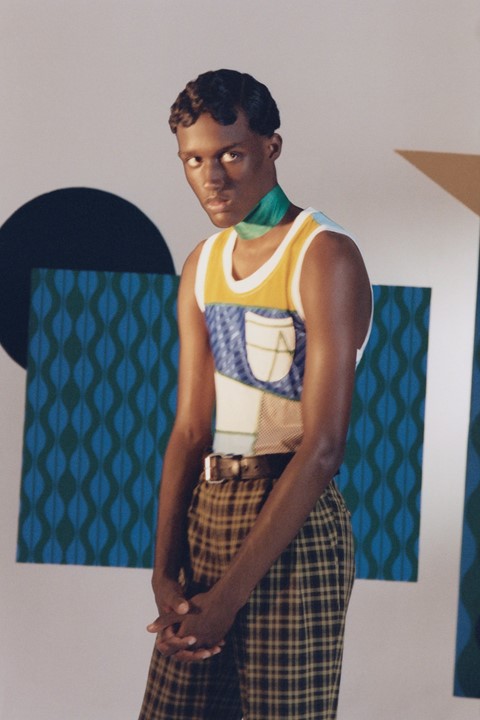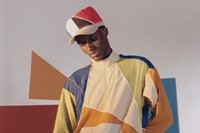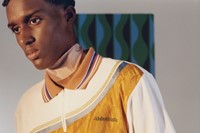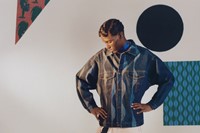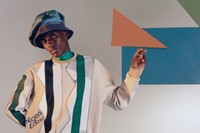Priya Ahluwalia speaks with Vincent Desmond about her Spring/Summer 2021 collection, which sees her collaborate with Lagos-born graphic designer Dennis McInnes
“The name of the collection, Liberation, came to me at the end of the design process, not at the beginning,” says Priya Ahluwalia of her Spring/Summer 2021 collection, shown digitally today as part of London Fashion Week. “A lot of ideas that came up during the research were about people wanting liberation, wanting freedom. I also took what is going in the world right now into consideration.” Collaborating with Lagos-born British graphic designer Dennis McInnes, the pair examined the political and social unrest of Nigeria in the 1960s, poring over archival materials, newspaper clippings and photographs, all of which have now come together with the current global Black Lives Matter protests to serve as the visual foundation for Ahluwalia’s S/S21 collection.
Born to a Nigerian father and a second-generation Indian mother, British menswear designer Priya Ahluwalia launched Ahluwalia in 2018 after she graduated from the University of Westminster, where she studied the Menswear Masters. In 2020, Ahluwalia became one of the eight LVMH Prize finalists and was named as a part of Matches Fashion’s Innovators programme; earlier that year she was also listed as one of the Forbes 30 under 30 on the European Arts and Culture list. Her namesake label combines elements and influences from her Nigerian and Indian heritage, using the insights she has from these cultures to shape and inform her design ethos. Nigeria – and its capital city Lagos – has been of particular influence; it was was during a trip there that she discovered the trail of the Western second-hand clothing industry, sparking a fascination with ethical production which remains at the heart of her label today (the majority of Ahluwalia’s pieces are made from repurposed clothing, fabrics or deadstock).
Ahluwalia’s S/S21 offering – presented via a series of images, photographed by Joyce Ng and styled by AnOther’s senior fashion editor-at-large Nell Kalonji – features a more restrained palette from the designer: beige and grey, with even the yellows and greens muted to reflect the designer’s emotions, which kept evolving throughout the design process. Nonetheless, the collection remains typically direct. “This season, because of Covid, I had it in my mind that Ahluwalia wouldn’t be showing the collection in real life,” she said. “I had a feeling that it would be digital, and I really wanted to make sure I was designing pieces that would communicate well online ... so it was really important in using graphic elements in the design.”
Here, as the collection is released on London Fashion Week’s digital platform, Ahluwalia explains the spirit and emotion behind the Spring/Summer 2021 collection in her own words.
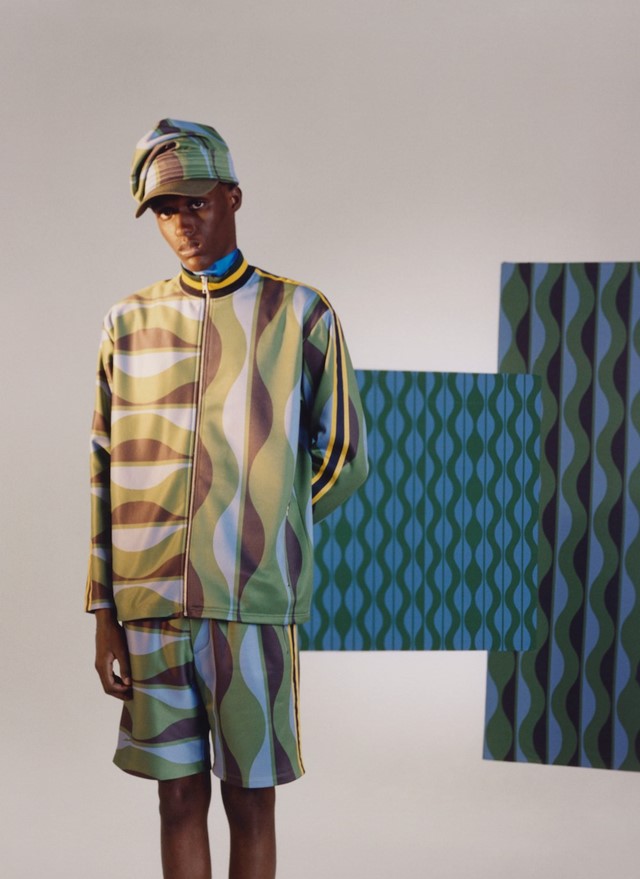
“My dad is Nigerian and my mum is Indian. I was born in London so growing up meant that I was privileged to experience a mixture of cultures, of food, music and film. It’s all just a melting pot. I only started analysing it as I got older, but it definitely does influence my tastes, choices and materials when it comes to designing and creating. [My father and uncle] are really quite stylish and I am always looking for photos of them, especially of my uncle; looking at what he was wearing and the way he styled it and I don’t think he would even realise that he was stylish. I think he just put it on because he felt like that’s what he wanted to wear. But I’ve definitely always looked at those and got inspired. I guess they are like family archives, and sometimes it’s the attitude in the pictures that’ll get me inspired or the mood or the cut of certain things and I’ll just go from there.
“A lot of the visuals for the collection came from looking at books that had illustrated diagrams of the presence of Black people in the US. And some newspaper articles, old newspaper articles from Nigeria, in this book that we found. So there was a mixture of inspiration. But a lot of the themes of what we’re coming across in the research was just like these ideas and stories of people who wanted freedom and liberation.
“When I was prepping for the collection, I knew I wanted to have graphics in it so I collaborated with Dennis McInnes who is a Lagos-born but London-based graphic designer. Dennis and I have known each other for a long time. I’ve admired his work from afar. He was the first person that came to mind because I’ve seen other work that he’s done. And I also knew that he would get my subject matter. I knew that he would come with extra insight and thoughts on it, because he has lived in Lagos and I knew his perspective on this was going to be really, really fresh.
“The collection has bases of beige and grey, which are not normally Ahluwalia colours, but then they’re accentuated by muted yellows and greens. The colour palette is reflective of my mood; I feel kind of grounded at the moment. But then the collection also features different elements, like printed pieces that will really come from Dennis’ artworks. We’ve got the denim pieces which are lasered with graphics developed with him. So, instead of using bleaches or chemicals, the patterns have been lasered onto the denim. We’ve also got patchwork shirting, that sort of fits in the inspiration of the collection and the books with the illustrated graphics about America. And the beaded polo which I do an iteration of every season. This season, because of Covid, I had it in my mind that Ahluwalia wouldn’t be showing the collection in real life. I had a feeling that it would be digital, and I really wanted to make sure I was designing pieces that would communicate well online, so it was really important in using graphic elements in the design.
“Everything that’s going on this year is really political, whether we like it or not, and it’s seeping into what we create. When you’re reading so many different books and newspaper articles it’s hard to not think about what’s going on with Black people in the world. And creatives have all taken different paths, some have gone with escapism, creating things that will help them escape, but some like myself are trying to harness it. I definitely don’t want to suggest that I’m trivialising anything that’s going on into clothing, because I’m really not. But when you’re creating, it’s hard not to think about it or not to be influenced by it or want to celebrate all the ways that Black culture has created so much beauty over the years. Then in terms of Covid, it has been difficult because of things like sourcing and access to things. So instead of the simple routes, we think about different ways, and some of that has been through sourcing locally and using textile markets like Tooting Market near me which is really nice because we are supporting the local community.”
